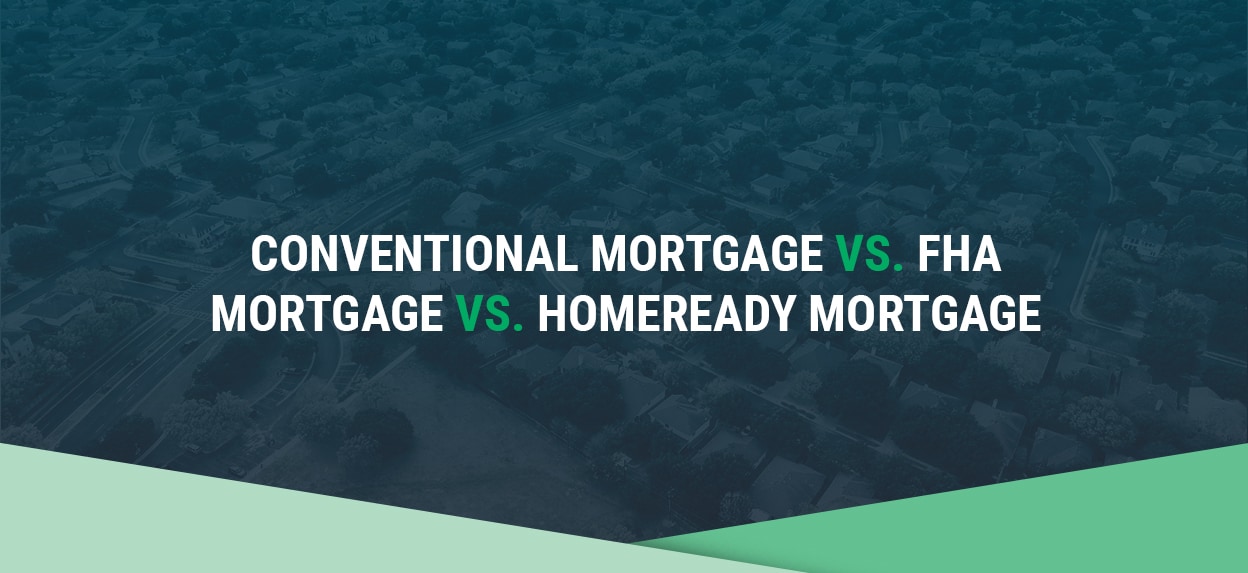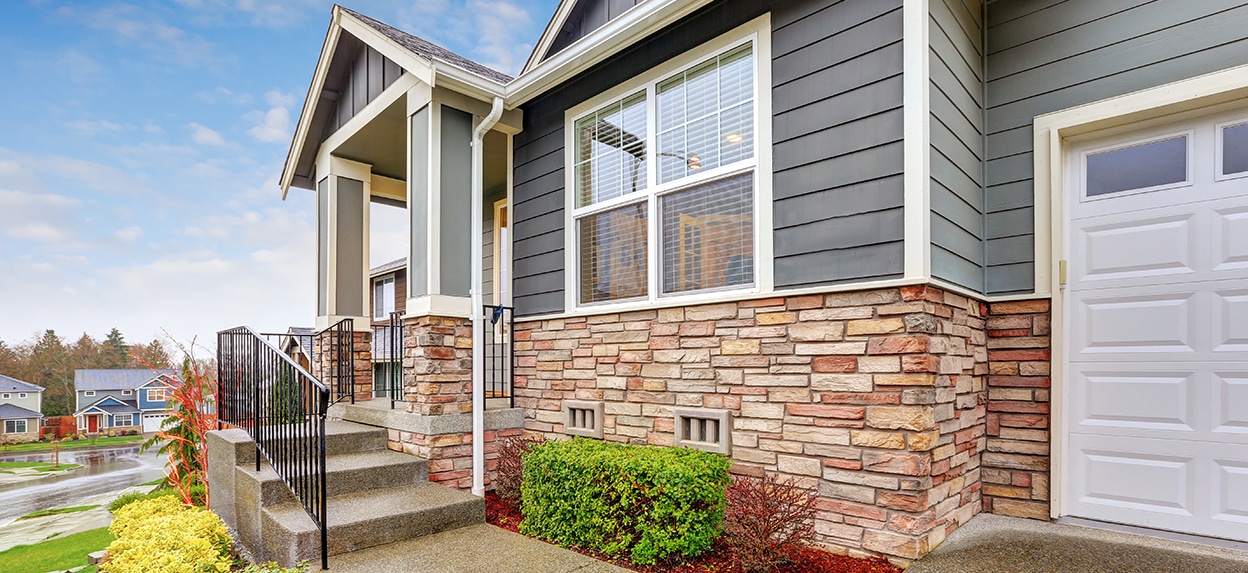HomeReady Mortgage vs FHA vs Conventional Loan

When you first start shopping for a home and lender – you could be presented with many mortgage programs and decisions to make. Below, there will be a breakdown of two of the most common mortgage programs used (Conventional and FHA) and a third program called HomeReady.
Choosing a mortgage program can be simple with the help of your loan officer. Remember, there is no good or bad program, but a wide array of specifically designed programs to help any type of borrower who walks through the door.
Once you present the necessary financial information to your loan officer, they’ll be able to pair you with the perfect mortgage program. When you figure out which mortgage program is best for you, compare terms across at least two lenders, one might offer slightly different rates and terms than the other. Keep reading to learn about Conventional, FHA, and the HomeReady mortgage programs.

Conventional Mortgage
The word conventional implies that this is the program used across most borrowers, but it’s becoming less common to use conventional mortgage programs as home prices rise. Conventional mortgage programs generally require a 20% down-payment and with home prices as record highs (as of 2022), putting 20% down is not as realistic for most first-time homebuyers.
Conventional mortgage programs are not backed by a government agency (compared to FHA) and are financed completely through a lender of your choosing. Since most of the risk is on the lender, conventional mortgages have higher requirements to secure financing – requiring a larger down payment and a stellar credit record.
Conventional mortgage programs come with a fixed interest rate, meaning that it won’t change throughout the life of the loan. You always have the option to refinance if interest rates drop – but keeping monthly payments consistent is important for a budgeting first-time homeowner.
Talk with your loan officer to learn more about current rates and when the best time to lock in yours would be. If you need help finding a loan officer, reach out to Neighborhood Loans or visit our website for more information. (www.neighborhoodloans.com)
The benefit of a conventional mortgage is making a larger down payment starts you with more equity in your home. This translates to a lower monthly payment and more room in your budget for anything else that might come up. If you can afford a down payment of 20%, there aren’t many reasons to not go with a conventional mortgage program.

FHA Mortgage
The Federal Housing Administration (FHA) helps provide closing costs or other assistance to low-income or below-average credit borrowers. The FHA loan program operates through approved lenders like us and is a great choice for any first-time homebuyers. FHA Loans only require a minimum down payment of 3.5% and can be secured with average FICO scores. This is much less intimidating than the requirements attached to a conventional loan.
When you make a down payment that is less than 20% of the home’s price, you’ll be required to hold additional private mortgage insurance (PMI) on top of your traditional home insurance. Private mortgage insurance is added to your regular monthly payment and will be similar in value to your home insurance. This is required until your loan-to-value ratio reaches 80% (equal to a 20% down-payment).
Many factors go into qualifying for a mortgage loan, but there are a few that stand out above the rest. Lenders will look closely at the borrowers’ credit score, how current debts are managed, the ability to repay the loan, current assets, and the value of the home being purchased.
When lenders look at a potential homeowner’s income, they generally like to see stability going back two years, how much they are currently earning, and how likely is it to continue over the next few years. If borrowers are interested in using a down payment assistance program, they will be restricted by an income limit.
Buying a home through an FHA-approved lender is a great option for first-time homebuyers or anyone who might need down payment or closing cost assistance. If you have any questions or are interested in getting started, reach out to Neighborhood Loans today! (https://neighborhoodloans.com/contact-us/)

HomeReady Mortgage
The HomeReady Mortgage program is backed by Fannie Mae (fanniemae.com), meaning that if the borrower defaults on the loan – the lender will be reimbursed by Fannie Mae (the reason for private mortgage insurance). Similar to FHA, the HomeReady mortgage program was designed to assist low-income or below-average credit borrowers. Requirements to secure funding are lower than a conventional mortgage and you can even use gift funds from friends and family if possible!
The HomeReady mortgage program can be qualified for with a down payment as low as 3% and a credit score in the low 600’s. These numbers and the rate and terms offered could be slightly different based on the lender you choose – which is why it’s important to sit down with at least two lenders to carefully review your options.
The HomeReady mortgage program can be used to purchase a home or refinance your current property – but at least one borrower will be required to take a homeownership education course. They are available online and necessary to secure funding.
This is just one of the many mortgage assistance programs available to borrowers across the country. Talk to your local lender or loan officer to learn more about what programs could be available to you.
When you look to secure funding from a lender – they’ll do a deep dive into your employment, income and credit history, debt-to-income ratio, and any prior bankruptcies or foreclosures. Getting financial documents in order before you start the process is crucial to a successful home buying process.
If you have any questions or would like to start the home buying process today – reach out to Neighborhood Loans or visit us online at www.neighborhoodloans.com.
Other FAQ’s
What disqualifies me from an FHA Loan?
The only reason you would get denied for an FHA mortgage loan is if you are unable to make a monthly mortgage payment on time. Lenders will look at your credit score and debt to income ratio to get a good feel of your financial history. Based on that information, they will approve or deny you for a home loan – even if you get denied, there are ways to improve your financials and come back stronger. Some lenders will even help you lay out a plan to get you on track to purchase a home.
Do Sellers Dislike FHA Buyers?
The sellers of the property won’t dislike you as people – but some FHA programs have additional checks and requirements to get through the finish line. If there are too many requests coming from the seller, a buyer might be more likely to decline your offer. Sellers don’t want to put more money into a home they are leaving and want the process to go as smoothly as possible. If they have multiple offers and need to sell fast, they may just go with the best and quickest offer.
Can FHA Loans be Refinanced?
Of course! Any loan can be refinanced if it meets the eligibility requirements for the program. It’s also up to your lender to make sure that refinancing makes financial sense for you. There are many reasons to refinance and if you’d like to learn more about them, look at the information we have available. https://neighborhoodloans.com/refinance/
